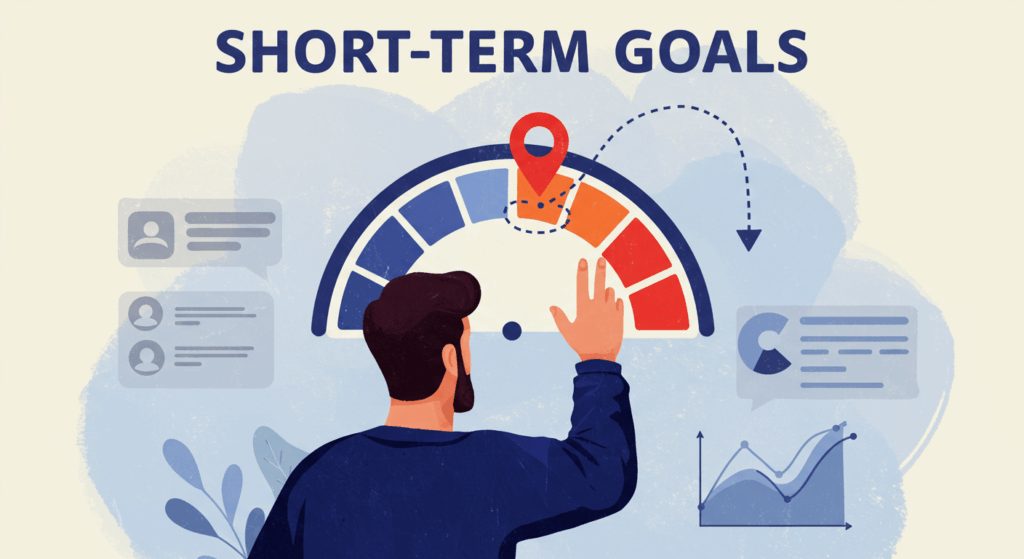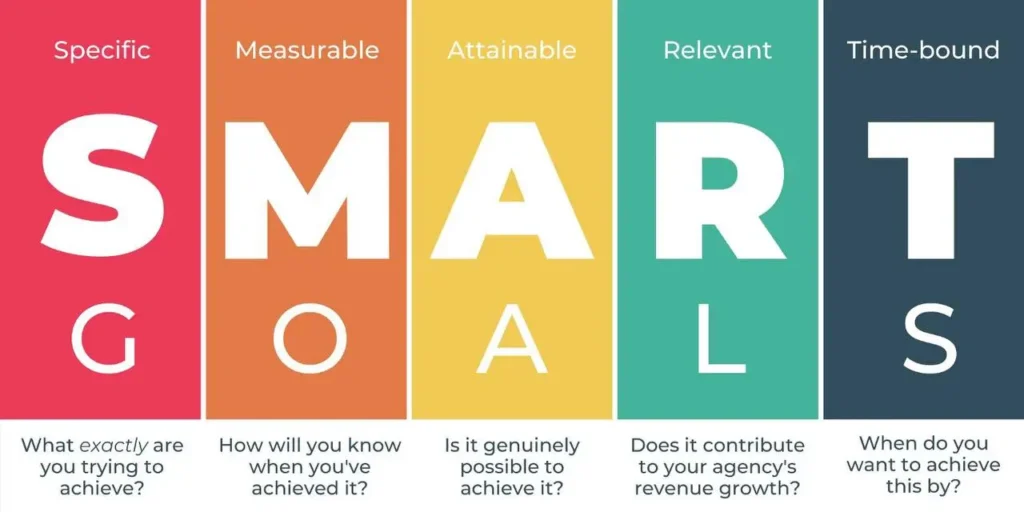Okay, real talk: setting goals can feel like online dating. Hear me out. Short-term goals? They’re like those quick flings you swipe right on because they look fun and exciting right now. Long-term goals? Those are the “this might be The One” vibes—the ones you know will take time, patience, and maybe a few awkward phases before you see the payoff.
The trick isn’t choosing between short term goals and a long term goal. It’s figuring out how to balance them so you don’t end up either burning out chasing quick wins or drifting endlessly toward something so far away it feels like chasing a mirage.
So let’s break this down in a way that’s not boring lecture vibes. Think of it as me giving you the low-key pep talk you needed today, with some relatable examples, goal setting quotes to sprinkle in a little inspiration, and maybe a nudge to actually do the thing you’ve been procrastinating on (yes, I’m looking at you 👀).
Why Short-Term Goals Matter
Short-term goals are like your daily energy boosts. They’re the little checkpoints that keep you from spiraling into “what am I even doing with my life?” territory.
Picture this: you decide you want to get healthier. A long time goal could be running a marathon. But that’s, like, way too far away to keep you motivated every day. Instead, you set a self development goal for the week: jog three times, or swap soda for water. Those are sample short term goals you can actually crush without losing your mind.
Examples of short term goals might include:
- Saving \$100 this month.
- Finishing that online course module tonight.
- Going to bed before midnight for five nights straight (yes, TikTok scrolling doesn’t count as “rest”).
The beauty of short time goals is they give you quick dopamine hits. They remind you that progress is possible even if the big dream is still a dot on the horizon.
Why Long-Term Goals Matter
Now, let’s not forget about the bigger picture. Long-term goals are your North Star. They’re the reason you put in effort even when it sucks. Without them, you’d just be grinding through random tasks with no endgame.
A long time goal could look like buying a house, building a business, writing a book, or traveling to 10 countries before you’re 40. These aren’t overnight vibes—they take strategy, persistence, and honestly, a lot of patience.
But here’s the catch: long-term goals without short-term wins can feel like climbing a never-ending staircase. That’s when people give up. Balancing both is what keeps you from getting stuck in “meh” mode.
The Secret Sauce: Balancing Short and Long
So how do you actually juggle both? Think of it like Spotify playlists. Your long-term goals are the big playlists (like “Road Trip Forever”), while short term goals are the songs that keep you moving track by track. Both matter, but you gotta make sure the songs fit the vibe.
Here’s how to keep it balanced:
- Break it down – Every long term goal should have short term goals examples attached. Want to save \$10k? Start with \$500 this month. Want to write a novel? Start with 500 words a day.
- Celebrate wins – Even the tiny ones. Finished a draft? Treat yourself. Hit a new personal best at the gym? Brag about it in the group chat.
- Stay flexible – Sometimes life throws curveballs (looking at you, global pandemics). Be ready to pivot your plan without losing sight of your bigger goals.
SMART and SMARTER: Your Goal-Setting BFFs
You’ve probably heard of SMART goals, but in case you forgot (or zoned out when your manager explained it in a meeting), here’s the gist: Specific, Measurable, Achievable, Relevant, and Time-bound. An example of a smart goal could be: “Read 2 books by the end of the month” instead of the vague “Read more.”
Now, the cooler cousin is SMARTER goals. The extra E and R stand for Evaluated and Reviewed. An example of smarter goals is checking in weekly to see if your workout plan is working or if you need to switch it up. Honestly, this is clutch for avoiding burnout and staying adaptable.
You can find endless examples of smart goals and even smarter ones online, but the real deal is customizing them to your actual lifestyle. If you’re not a morning person, setting a goal to wake up at 5 a.m. daily might not be it.
The Emotional Side of Goal Setting
Let’s be real, goals aren’t just checklists—they mess with your emotions too. Sometimes you’ll feel on top of the world, other times you’ll spiral into an existential crisis because you’re not where you thought you’d be by 25. (Been there, cried through it, got pizza after.)
That’s why goals for personal growth matter just as much as career or money goals. Examples of smarter goals here might include journaling daily, practicing gratitude, or learning to say “no” when you need boundaries. Self growth goals keep you grounded and remind you that success isn’t just about external achievements—it’s about internal peace too.
Motivation Hacks That Actually Work
Okay, but how do you stay motivated long enough to balance both types of goals? A few tips I’ve stolen from trial and error (and too many podcasts):
- Use goal setting quotes and sayings – Cheesy? Maybe. Effective? 100%. One of my favorites: “A goal without a plan is just a wish.” That’s one of those quotes about setting goals that low-key punches you in the face with truth.
- Visualize it – No, not woo-woo vision boards (unless you’re into that). Just take a moment to picture how it’ll feel when you achieve your self development goals. That energy can carry you through boring grind days.
- Accountability buddies – Tell a friend, post it online, or track it in an app. Having someone or something keeping you in check is underrated.
Common Mistakes When Balancing Goals
Let’s talk about what not to do, because we’ve all been there:
- Only focusing on short term goals – You end up busy but not really moving forward. It’s like cleaning your room every day but never actually fixing the leaky sink.
- Only focusing on long term goals – You’ll feel stuck and unmotivated because progress seems too far away.
- Comparing timelines – Just because your college friend already hit their dream job doesn’t mean you’re failing. Everyone’s pace is different.
Personal Growth + Achievement = Success
At the end of the day, goals aren’t just about hitting milestones. They’re about growth. A self development goal could be learning how to manage stress, while a goal for self development might be building better communication skills. Personal growth goals often lead to more lasting happiness than material ones.
The sweet spot is when your short term goals and long-term dreams align with your values and who you want to become. That’s when life feels less like a chaotic mess and more like… well, a messy playlist you actually love.
Final Thoughts
Balancing short term and long time goals isn’t about being perfect. It’s about building momentum while keeping your eyes on the bigger picture. Some days you’ll crush it, other days you’ll flop—and that’s okay. Progress beats perfection, every time.
So, what’s one tiny short-term thing you can do today that nudges you closer to your long-term dream? Maybe it’s sending that email, drinking more water, or writing the first paragraph of the book you’ve been talking about forever.
Remember: small steps, big vision. You got this.
Now go out there and set some goals—and don’t forget to hype yourself up along the way.









